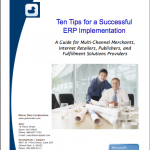5 Reasons for Retail Failure
Many reasons can cause problems with a retail business – poor pricing, location, not enough stock, poor planning, all of which can lead to unsatisfactory customer experience and ultimately, failure.
It’s important to understand why a project failed to learn for future success. How can things be different? How can you succeed next time? If you explore reasons for failure, you can use that information to help avoid it in the future.
Poor Location
Location might not seem important, but it is – especially if you’re thinking about international expansion. What do customers in that country expect of their local businesses? What do employees expect? What are the various business and employment laws? If your business is local, it’s crucial to know who your customers are and where they are. Keep these things in mind when deciding where your store will live.
Inappropriate Pricing
 Even in your home country, pricing is important for similar reasons – what do customers expect? How far will your customers travel for your products? Can the area support your pricing structure? If your competitors are charging much less, which store will shoppers pick?
Even in your home country, pricing is important for similar reasons – what do customers expect? How far will your customers travel for your products? Can the area support your pricing structure? If your competitors are charging much less, which store will shoppers pick?
Make sure your prices reflect your shoppers’ budgets, and that you can keep up with pricing of your competitors.
Not Enough Stock
Exceptional warehouse control, real-time inventory management, and communication between the distribution center and your ERP system are crucial to maintaining customer satisfaction. Think about it – who wants to shop for groceries in a store that doesn’t keep enough fresh produce in stock? or milk? or bread? Similarly, when shoppers look for clothes, they want to go to stores that carry their styles and sizes.
The other side of this problem is too much inventory because you don’t know how much you need. If you order a million dollars in inventory and don’t sell it in a timely manner, your money is losing interest because it is tied up while inventory sits in the warehouse.
Use an exceptional integrated ERP system to increase productivity. Here are ways your ERP system can help with this.
Inexperienced Partners
There are many things to consider, such as fraud, theft and security, and even training. When working with other parties or their software, unexpected obstacles and delays may be introduced, such as schedule conflicts, terminology misunderstandings, errors, unexpected expenses, and customer service issues. Being on the alert for this and working with experienced businesses and trading partners will go a long way in helping your projects stay within budget and on time.
No Planning
Determine your detailed plan of action items and include the names of the individuals who will be responsible for those tasks. Hold them responsible for the work assigned to them and require a weekly status report on completed tasks and road blocks encountered. This is especially important when implementing critical software for your enterprise.
 In more than three decades, the biggest mistake we see companies make is to not create an action plan that covers all aspects of implementation. For more valuable information about Implementing your ERP system, download our “Ten Tips for a Successful ERP Implementation” paper. Whether you’re considering a new ERP system or you’re just beginning an implementation, this paper will help you keep your implementation within budget and on time.
In more than three decades, the biggest mistake we see companies make is to not create an action plan that covers all aspects of implementation. For more valuable information about Implementing your ERP system, download our “Ten Tips for a Successful ERP Implementation” paper. Whether you’re considering a new ERP system or you’re just beginning an implementation, this paper will help you keep your implementation within budget and on time.






It’s true,Mentioned above are the main reasons for retail failure, but sometimes all those things are working well yet merchant succeed because No-one is aware of their store and brand. So, I suggest first increase brand awareness Simultaneously also improve above mentioned things.
Thank you for your comment. We agree that branding is also important. Here is one idea for promoting your brand: https://www.getinorder.com/blog/index.php/add-your-brand-to-your-boxes-to-encourage-your-customers-to-shop/.
Hi Cheryl ,
I have read your given tips for brand that is such an amazing tips.